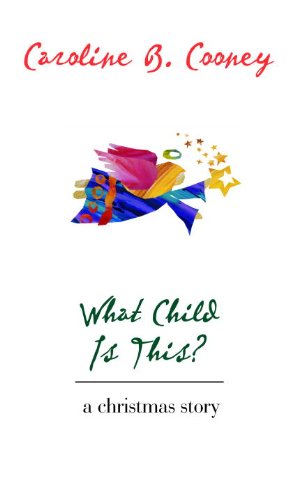Eve and Morn

Mamacita says: Christmas is such a magical time. We anticipate it all the rest of the year, and then suddenly it’s here, and it’s so special, so wonderful, and it’s over so quickly. . . .
Let’s not forget how Katie, age 8, in a book I quote probably way too much but how can one help it when the book is so full of wonderfulness, What Child Is This, by Caroline Cooney, put into innocent words that the night before Christmas isn’t called a ‘night,’ it’s called ‘eve,’ and Christmas morning isn’t called ‘morning,’ it’s ‘morn.’ Eve and morn: two special words to highlight two special times.
How special are they? They are special already, in their own right, but how you make them special for yourself and for your children is entirely up to you. I hope you give them memories they will cherish all their lives, so much so that they will pass the glory along to their own children.
Children flourish with roots, but they soar with wings.
May your Eve be full of anticipation and warmth, and may your Morn be all you hoped it would be.
Christmas Quotations

Mamacita says: I love these days leading up to Christmas more than any other time of the year. I love the planning. I love the baking. I love the making lists. I love the shopping, which I actually do all year long. I love the Amazon super-secret-discount-deals. I love wrapping the boxes and decorating them with ribbons and glittery things. I love the Christmas cd’s in my stereo. I love getting out and using the Christmas plates and bowls and glasses. I love making my house look like a Christmas card. I love welcoming people into my home and sharing everything I have with them. I love watching Christmas movies, which I’m doing today, in fact; welcome to my Dickens’ A Christmas Carol marathon – updates Twittered regularly. I know the book by heart, thanks to my father, and I’m quite critical of any movie version that takes too many liberties. Any liberties, actually. I mean, why diddle with perfection? (Stupid scriptwriting doodlers. . . .)
#25 is my favorite. I think of it regularly. It reminds me of my father, before the diabetes made him. . . different. He used to read Dickens’ A Christmas Carol aloud to us when we were really little. I loved it. I loved the big words, and the three ghosts, and the lessons learned. Dad would explain what the big words meant so next time we would understand the story even better. We did, too. “What is a doornail, Daddy, and how could it be dead?” I loved hearing Dad read out loud. He used to do it a lot when we were little.
Dad loved Christmas more than any little kid ever could. He could shake a package and guess what was in it, and most of the time he was right. He used to lie on the floor and just gaze at the tree. His own childhood was pretty bleak; maybe that was why he threw himself into Christmas for his children so thoroughly. The reading aloud might have been my favorite part.
1. There’s nothing sadder in this world than to awake Christmas morning and not be a child. — Erma Bombeck
2. This is the message of Christmas: We are never alone. — Taylor Caldwell
3. Remember, if Christmas isn’t found in your heart, you won’t find it under a tree. — Charlotte Carpenter.
4. Unless we make Christmas an occasion to share our blessings, all the snow in Alaska won’t make it ‘white’. — Bing Crosby
5. Christmas, my child, is love in action. — Dale Evans
7. My idea of Christmas, whether old-fashioned or modern, is very simple: loving others. Come to think of it, why do we have to wait for Christmas to do that? — Bob Hope
8. The joy of brightening other lives, bearing each others’ burdens, easing other’s loads and supplanting empty hearts and lives with generous gifts becomes for us the magic of Christmas.
— W. C. Jones
9. Christmas gift suggestions: To your enemy, forgiveness. To an opponent, tolerance. To a friend, your heart. To a customer, service. To all, charity. To every child, a good example. To yourself, respect. — Oren Arnold
10. The perfect Christmas tree? All Christmas trees are perfect! — Charles N. Barnard
11. Blessed is the season which engages the whole world in a conspiracy of love. — Hamilton Wright Mabie
12. Christmas is a necessity. There has to be at least one day of the year to remind us that we’re here for something else besides ourselves. — Eric Sevareid
13. Christmas, children, is not a date. It is a state of mind. — Mary Ellen Chase
14. There has been only one Christmas – the rest are anniversaries. — W.J. Cameron
15. Our hearts grow tender with childhood memories and love of kindred, and we are better throughout the year for having, in spirit, become a child again at Christmas-time. — Laura Ingalls Wilder
16. Instead of being a time of unusual behavior, Christmas is perhaps the only time in the year when people can obey their natural impulses and express their true sentiments without feeling self-conscious and, perhaps, foolish. Christmas, in short, is about the only chance a man has to be himself. — Francis C. Farley
17. Love is what’s in the room with you at Christmas if you stop opening presents and listen. — Author unknown, attributed to a 7-year-old named Bobby
18. In the old days, it was not called the Holiday Season; the Christians called it ‘Christmas’ and went to church; the Jews called it ‘Hanukkah’ and went to synagogue; the atheists went to parties and drank. People passing each other on the street would say ‘Merry Christmas!’ or ‘Happy Hanukkah!’ or (to the atheists) ‘Look out for the wall!’ — Dave Barry
19. When we were children we were grateful to those who filled our stockings at Christmas time. Why are we not grateful to God for filling our stockings with legs? — G.K. Chesterton
20. The message of Christmas is that the visible material world is bound to the invisible spiritual world. — Author Unknown
21. The Supreme Court has ruled that they cannot have a nativity scene in Washington, D.C. This wasn’t for any religious reasons. They couldn’t find three wise men and a virgin. — Jay Leno
24. Christmas – that magic blanket that wraps itself about us, that something so intangible that it is like a fragrance. It may weave a spell of nostalgia. Christmas may be a day of feasting, or of prayer, but always it will be a day of remembrance – a day in which we think of everything we have ever loved. — Augusta E. Rundel
25. There are many things from which I might have derived good, by which I have not profited, I dare say, Christmas among the rest. But I am sure I have always thought of Christmas time, when it has come round — apart from the veneration due to its sacred name and origin, if anything belonging to it can be apart from that — as a good time: a kind, forgiving, charitable, pleasant time: the only time I know of, in the long calendar of the year, when men and women seem by one consent to open their shut-up hearts freely, and to think of people below them as if they really were fellow-passengers to the grave, and not another race of creatures bound on other journeys. And therefore, uncle, though it has never put a scrap of gold or silver in my pocket, I believe that it has done me good, and will do me good; and I say, God bless it! — Charles Dickens
I say God bless it, too. God bless all of you, too. Every one.
Merry Hogwarts Christmas To You

 Mamacita says: James and Lily Potter weren’t the only parents who knew about magic, you know. I love to imagine Christmas at the Burrow, also; Molly and Arthur Weasley, poor as they were, must have given their large family a wonderland of inexpensive dreams-come-true. Hogwarts gave its students a magical Christmas experience, too, as all good teachers and schools do used to do. Authority figures owe it to children to do so.
Mamacita says: James and Lily Potter weren’t the only parents who knew about magic, you know. I love to imagine Christmas at the Burrow, also; Molly and Arthur Weasley, poor as they were, must have given their large family a wonderland of inexpensive dreams-come-true. Hogwarts gave its students a magical Christmas experience, too, as all good teachers and schools do used to do. Authority figures owe it to children to do so.
Parents owe their children some magic. It shouldn’t be an option. Children need magic, and parents can give it to them with not much effort at all.
Parents are magic, you know. ALL parents can do it if they try. We have, in our fingertips and in our heads and in all those old boxes, the power to transform ordinary things into things of magic and wonder. We have the power to transform an ordinary day into a Holiday. There is more than tinsel and glass and molded Hallmark treasures in those boxes. There are memories, stored in those boxes. There is each child’s First Christmas, in those boxes. There is the Christmas we were all too sick to go to Grandma’s, so we had to stay home and entertain each other. There is an ornament from the Christmas of the Emergency Room visit. There are ornaments made of styrofoam and glue and glitter. There is the ornament someone bought in the Chicago airport, just because it caught his eye and he thought someone else might like it. There is the ornament a little girl used to lie under the tree and watch, JUST IN CASE the elves would peek out the window of it and wave at her. There is the ornament with sad eyes that a little boy worried about, year after year, and which must be hung in exactly the same spot on the tree – and low, because it’s really, really heavy. I have a Christmas angel made out of a torn purple pillow case and a toilet paper tube, and a piece of that same pillow case with “Oh come holy spit” written on it in black magic marker. It’s worth more to me than anything in Tiffany’s. Erma Bombeck had one, too; when I read about hers I felt kinship! There are ornaments from friends, and ornaments found at yard sales and flea markets. Every ornament on our tree has a history. I know where and when everything on that tree was purchased, or made, or given. A real Christmas fanatic can tell you the circumstances under which almost any ornament on that tree was obtained.
I can look at my tree and see more than just a beautiful twinkling tree. I look at my Christmas tree and I can see all the years of my family’s life, represented on the branches.
I can remember, as a child, sitting on the floor and just staring at our tree. It was almost beyond my comprehension that our house could contain such glowing wonder. It was like magic. My mother created magic, in our house. How did she do it? I still don’t know. I only know that I have tried to create that same magic in my house, for my children, and I hope I have succeeded.
Why do I work so hard, harder even than Clark Griswold, to try and create a magical Christmas? The answer is easy. “Because.”
Power. Parents have power to change a mundane day into a day of wonder. Our children’s memories depend on our willingness to use that power.
Sometimes we are so physically exhausted that it’s difficult to put out the effort. Don’t ever let yourself get caught in that trap. Once you start, it’s easy to continue.
Your children are worth the time. And so are you. Get up from that chair, get those boxes down from wherever they’re stored, and get busy. Make magic for your children.
Otherwise, they won’t know how to make magic for their own children






